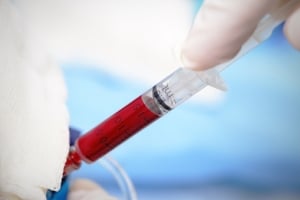 There was a story in the Knoxville News Sentinel recently about a case stemming from 2011. In sum, a police officer drew some blood from a driver involved in a fatal accident, even though the officer didn’t have a warrant. It went back and forth in the courts as to whether that was legal, and when the Tennessee Supreme Court heard the case, they sided with the officers, saying “that the officer who drew blood after the 2011 crash in Knox County was acting on the basis of the state’s interpretation
There was a story in the Knoxville News Sentinel recently about a case stemming from 2011. In sum, a police officer drew some blood from a driver involved in a fatal accident, even though the officer didn’t have a warrant. It went back and forth in the courts as to whether that was legal, and when the Tennessee Supreme Court heard the case, they sided with the officers, saying “that the officer who drew blood after the 2011 crash in Knox County was acting on the basis of the state’s interpretation
The Fourth Amendment of the U.S. Constitution says “The right of the people to be secure in their persons, houses, papers, and effects, against unreasonable searches and seizures, shall not be violated, and no warrants shall issue, but upon probable cause, supported by oath or affirmation, and particularly describing the place to be searched, and the persons or things to be seized.”
Generally speaking, this is interpreted to mean that without a warrant, law enforcement can’t simply barge into your home and take your things. They also can’t take your blood or your saliva or your hair (“secure in their persons,” after all) unless there is a reasonable cause, and an ensuing warrant, to do so.
It’s the word “unreasonable,” though, that sticks with us. If it is reasonable to assume that one of the drivers in the fatal accident was drunk, then perhaps it is reasonable to say that the seizure of blood taken by the officer was done so in good faith, and didn’t need a warrant. The problem we’re having is with the interpretation by our highest Court. They claim that they’re interpreting the U.S. Supreme Court’s decisions regarding taking blood from suspected drunk drivers – except that’s not entirely accurate.
This past June, the country’s highest Court issued a ruling that blood alcohol samples need a warrant. Justice Samuel Alito wrote the decision (We pulled the references to other cases so this would be easier to read, but you can find a copy of the full decision here):
“The Fourth Amendment permits warrantless breath tests incident to arrests for drunk driving but not warrantless blood tests. Taking a blood sample or administering a breath test is a search governed by the Fourth Amendment. These searches may nevertheless be exempt from the warrant requirement if they fall within, as relevant here, the exception for searches conducted incident to a lawful arrest. This exception applies categorically, rather than on a case-by-case basis….
Blood tests, however, are significantly more intrusive, and their reasonableness must be judged in light of the availability of the less invasive alternative of a breath test. Respondents have offered no satisfactory justification for demanding the more intrusive alternative without a warrant. In instances where blood tests might be preferable—e.g., where substances other than alcohol impair the driver’s ability to operate a car safely, or where the subject is unconscious—nothing prevents the police from seeking a warrant or from relying on the exigent circumstances exception if it applies.”
There is a “search-incident-to-arrest” doctrine, which basically means that the fact the arrest was lawful will justify a search, and it is possible that, given that the case from 2011 was a fatal crash, securing a sample might fall into this window – but it still makes us a little nervous.
If you believe that you have been the victim of an illegal search and seizure, you want an experienced Sevierville criminal defense lawyer on your side. You can contact the Law Office of Bryan E. Delius by calling 865-428-8780, or by filling out this form. We proudly serve clients in Sevierville, Seymour, Pigeon Forge and Gatlinburg.

Attorney Bryan E. Delius was born and raised in Sevier County, TN. He founded Delius & McKenzie more than 20 years ago, after receiving his JD from the University of Tennessee at Knoxville. He is admitted in Tennessee and in several federal court systems. Learn more about Bryan E. Delius.




